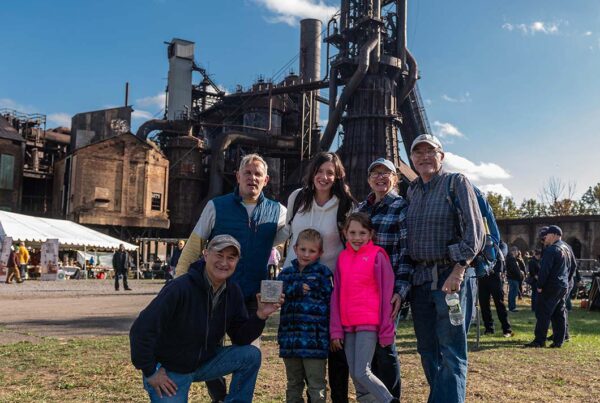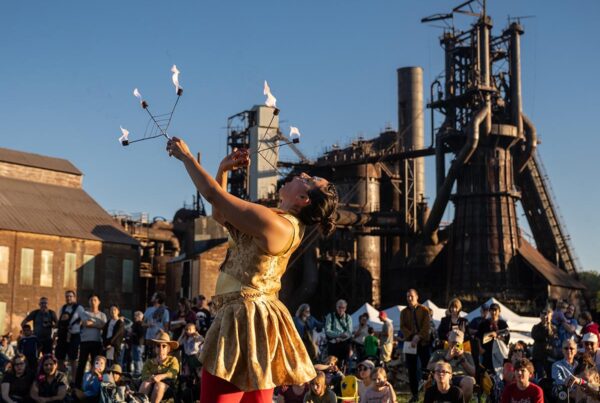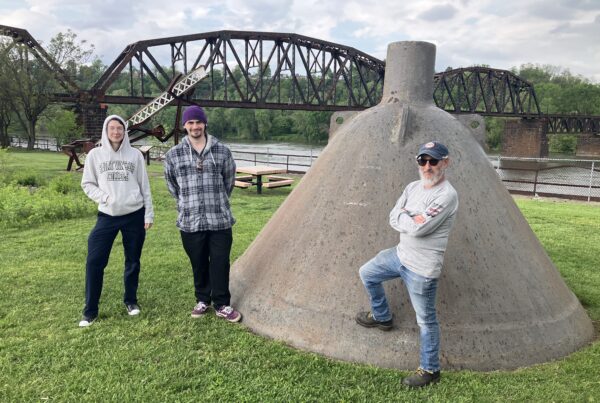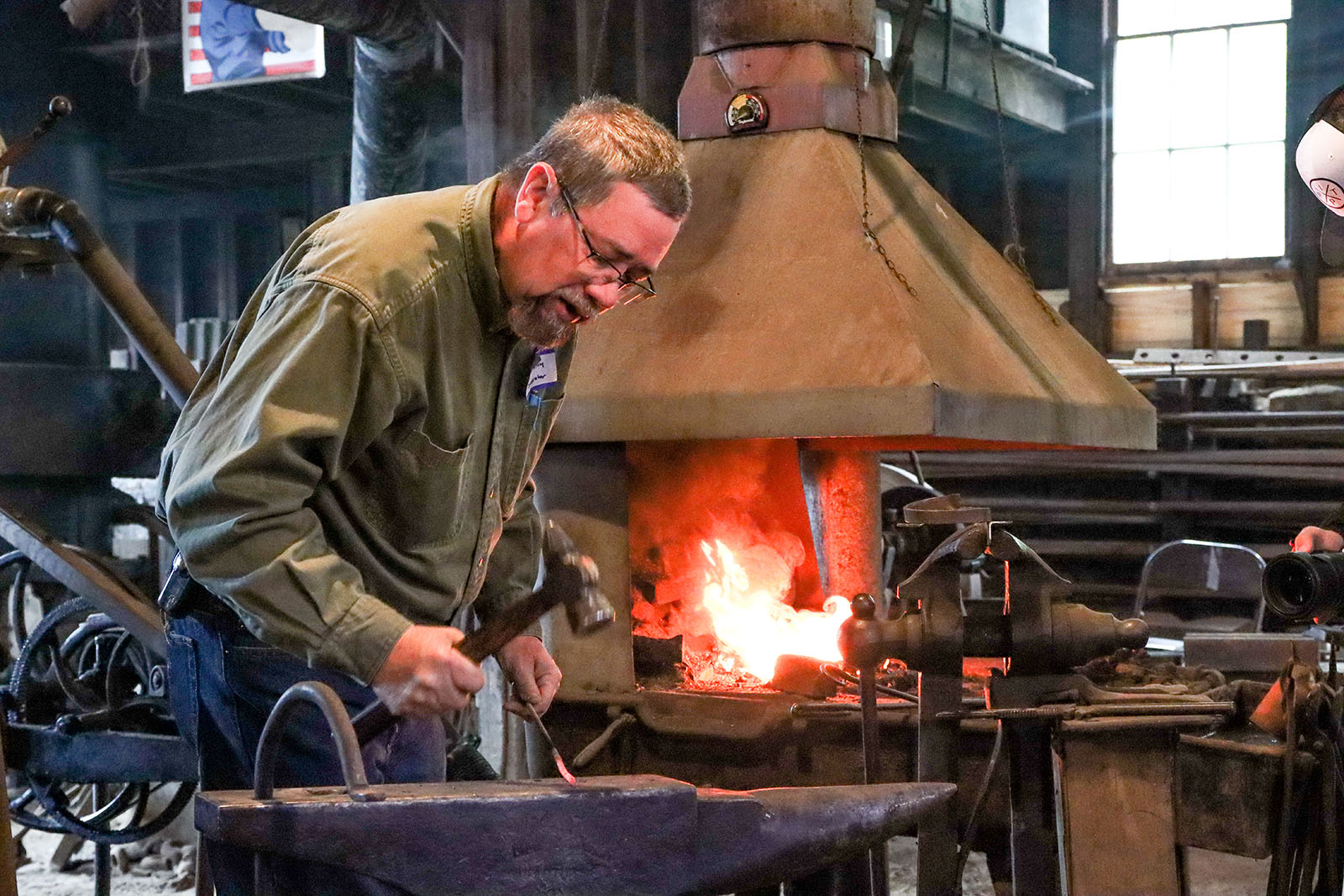
A blacksmith demonstration at the W.A. Young & Sons Foundry and Machine Shop for the Hammer-In Festival.
The 2024 Hammer-In Festival
By Lynne Squilla, Contributing Writer
Step back in time to the age of blacksmiths and local machine shops at the annual Hammer-In Festival in Greene County, about an hour south of Pittsburgh. Set in the charming town of Rices Landing, overlooking a rural stretch of the Monongahela River, the festival takes place in and around the wonderfully restored W.A. Young & Sons Foundry and Machine Shop. The event traditionally happens the third Saturday of April and promises something for everyone.
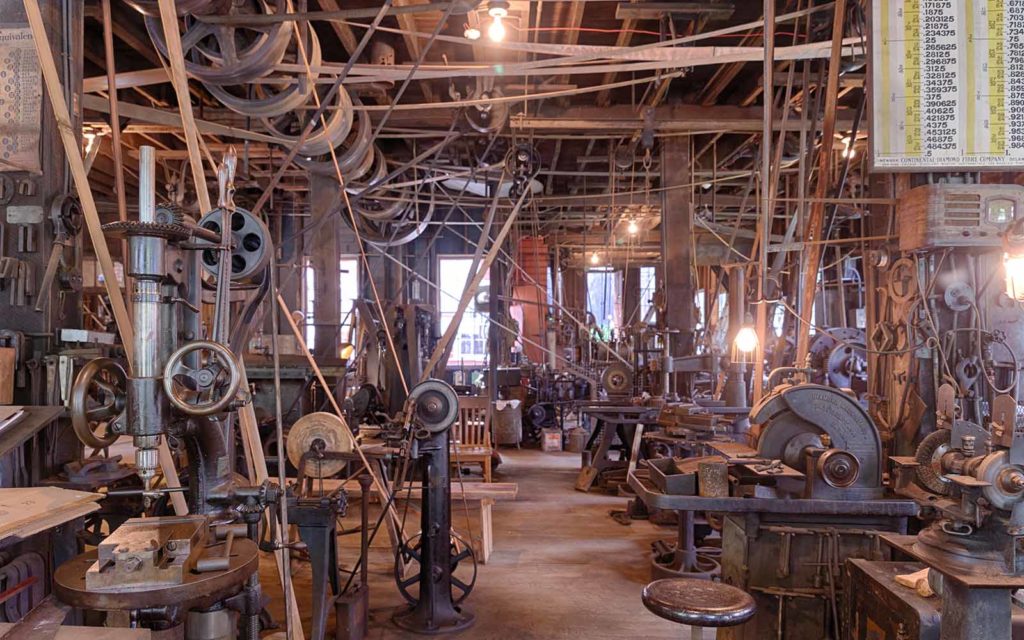
The interior of the front shop, featuring the machines and the line shaft system. Image by Richard Kelly Photography.
“This is a must-see attraction! And it’s surprising in this quiet neighborhood to have this amazing marker of our industrial heritage,” says Greene County Tourism Director JoAnne Marshall.
Approaching the 123-year-old shop with its red-barn clapboard exterior, the clang of hammers on anvils greets the ears. Tristate area blacksmiths will be demonstrating their artistry for the public to enjoy inside this National Historic Landmark. Metal casting, copper working, and a tour of the facility and its machines are also part of the experience, along with an auction, food, and a first-ever local crafts market.
“The Hammer-In has been going for 36 years (with two years off during COVID times),” T.J. Porfeli, Rivers of Steel’s historic site coordinator, explained. “It’s a rare chance to have access to blacksmiths. Here you’re surrounded by multiple blacksmiths with a variety of skill sets.”
Blacksmiths from Pittsburgh Area Artist Blacksmiths Association (PAABA) and the Appalachian Blacksmiths Association (ABA) will be crafting things such as hooks, kitchen utensils, animal and botanical forms, and more. A different smith will demonstrate every hour, taking questions, and describing this age-old process of heating and hammering iron into versatile, attractive, and functional items. It is a chance for craftsmen to meet and collaborate with one another, as well as to offer their skills for public hire. The event has become an immersive and educational way to keep the trade of blacksmithing alive and evolving.
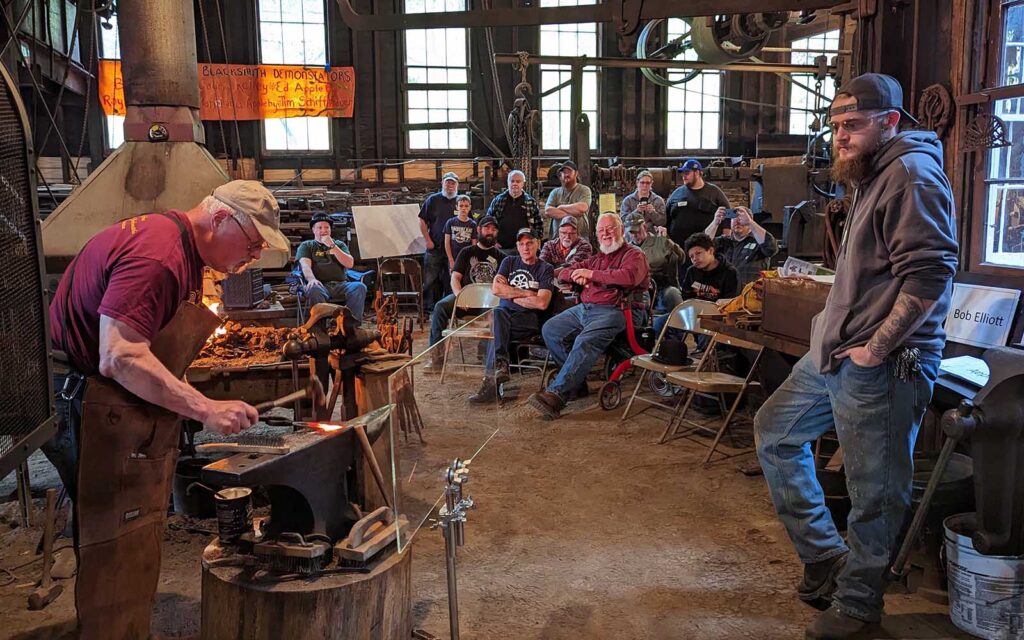
A small crowd observes a blacksmithing demonstration during the 2023 Hammer-In Festival.
Chris Holt, secretary and editor of PAABA, who is also a blacksmith, describes the fascination of watching her fellow artisans at work: “Instead of mass-produced stuff, people like to see the beauty of hand-crafted items. And if we don’t teach and use this skill, we’re going to lose it.”
The blacksmiths will also present some of their original craftworks that day at a public auction during the festival.
“There will be hooting and hollering as the auctioneer engages the public to open up their wallets to benefit the site,” says Porfeli. “There’s always amazing stuff there.”
Proceeds of the auction will go to PAABA and ABA and toward the continuing restoration of this local treasure—efforts led by Rivers of Steel after taking ownership of the unique facility in 2008. Funds from Save America’s Treasures and four Keystone Historic Preservation Construction grants helped restore the building itself.
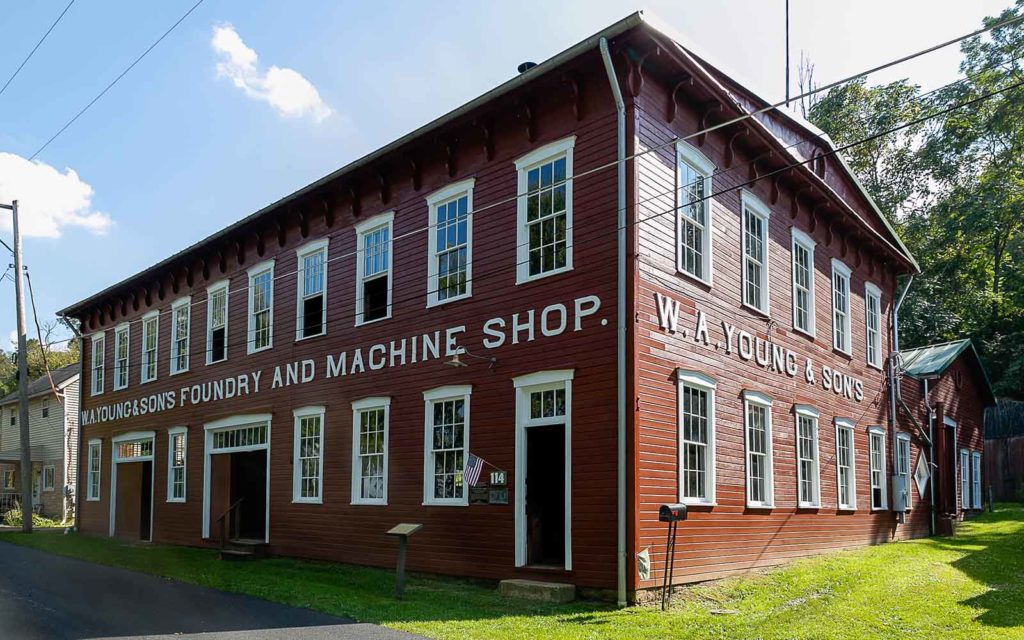
The restored exterior of the W.A. Young & Sons Foundry and Machine Shop, Rices Landing, PA. Photo by Richard Kelly Photography.
Ron Baraff, director of historic resources and facilities for Rivers of Steel, elaborates: “We have been able to replace the roof and repair the gutters and clapboard walls and windows and stabilize the building. If you lose that shell, you lose everything.”
“There is no other site like it, in terms of beauty of place and being completely untouched, and that’s largely because—and this is a good thing—it’s on the way to nowhere, in this cute little hamlet where time stood still,” Baraff shares. He goes on to say that the machines themselves were well maintained by the Young family and subsequent owners while the shop was open. “It’s also fortunate that it had and will continue to have neighbors and volunteers who are really interested in preserving and protecting this site. They’ve kept an eye on it for many years.”
Young & Sons is the nation’s last of the “small job” machine and metal-working shops that once supported local communities and industry. Before the early twentieth-century move to mass-production machining facilities, workers at Young & Sons would repair and make replacement parts for anything from bikes and automobiles to steamboat, coal mine, and small factory equipment. Unlike other such shops around the country, Young’s did not upgrade its late-1800s technology, except to switch its power sources over the decades—from steam to Bessemer gas to electricity. A period-accurate Bessemer engine will be on display at the event.
“This place is the epitome of being like the workers went to lunch and never came back,” according to Baraff. “Everything is just like it was when the last machine was turned off and more: every invoice was there, every chewed pencil. Everything was preserved, even the hardware store upstairs with all the little drawers and screws and bolts.”
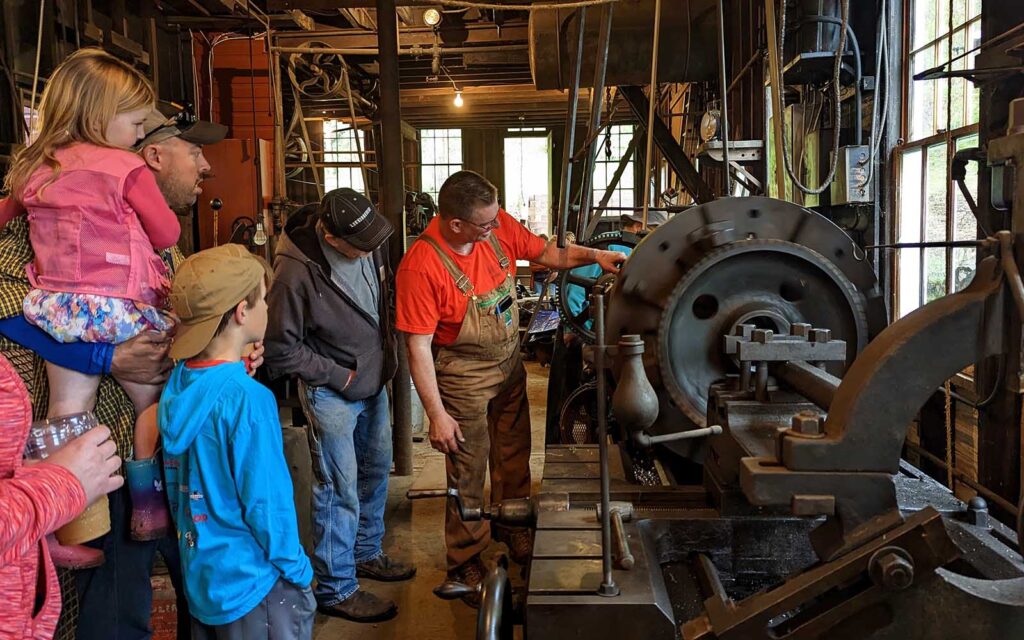
A family tours the Machine Shop during the 2023 Hammer-In.
The Young & Sons interior is both quaint and impressive, with its twenty-five line shaft-driven machines that fill the front shop, animated by a web of pulleys and belts that whirl and dance when switched on to run the old drill presses, lathes, pipe and bolt threaders, and milling machines. Currently, a lawnmower engine powers the entire system of functional machines.
Chris Holt reflects: “To see it all oiled and moving and gracefully doing its task . . . it’s amazing. It’s a whole ballet of machines happening in unison!”
The floor of the forge room is earthen, to prevent fire from flying metal sparks and the small smithing furnaces in the past. It makes a perfect setting for modern-day blacksmiths to ply their old-time trade.
The fact that time has not touched this gem of a workshop, which opened in 1900 and shut down in 1965, has been an asset for Greene County and all those who love industrial history and nostalgia in general. It has become a meaningful backdrop for the visiting blacksmiths, too.
“Other than how people are dressed, it could all be seventy, eighty years ago. The sounds, the sights, the smells. The volunteers and blacksmiths—they’ve breathed new life into this intimate space,” observes Baraff.
Chris Holt agrees: “The whole environment, the river, the machines. You can just imagine a paddle wheeler coming up the river, docking to get parts repaired. It’s this amazing frozen spot in time. It has to be seen to be believed!”
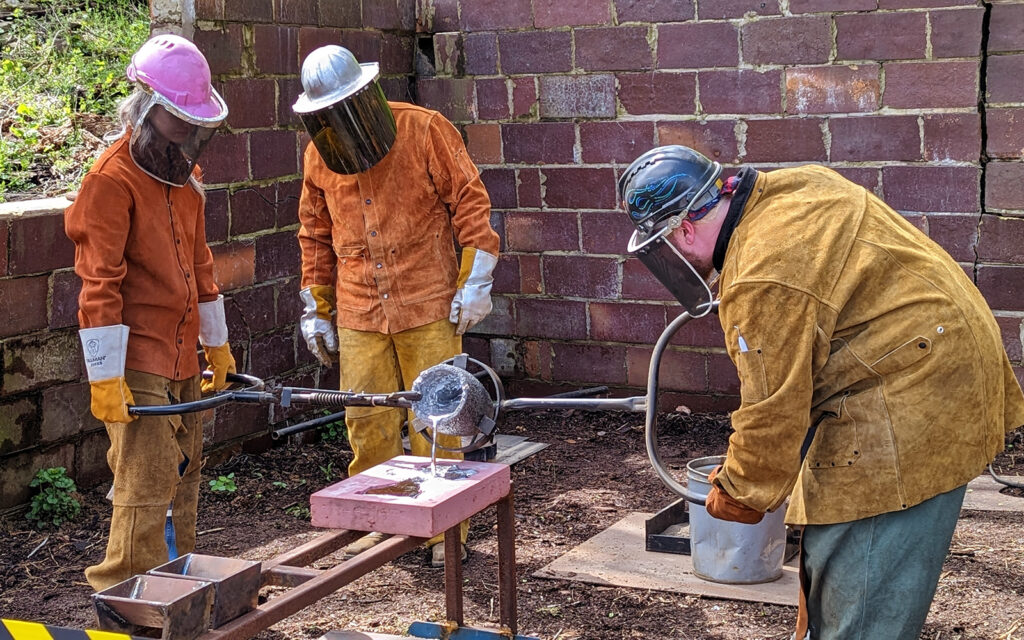
A moment from an aluminum pour demonstration during the 2023 Hammer-In Festival.
Rounding out the Hammer-In experience will be a first for the festival: a copper raising demonstration (hammering flat sheets of metal to create a vessel or tools) paired with the popular molten aluminum pour demonstration. Spearheaded by T.J. Porfeli, there will also be a first-ever makers’ marketplace, where local craftspeople will display their goods for sale to the public. The Boy Scouts will be selling food, and proceeds will benefit their organization.
“This place contributed to the economy of the region, and it’s still here and doing that,” says JoAnne Marshall. “I make sure I attend every year. You just never see blacksmithing like this. And then the crafts and the people . . . it just makes for a wonderful day.”
This family-friendly event happens on April 20, 2024. It is free to the public, and donations are always appreciated. Festivities begin at 9:00 a.m., with a welcoming ceremony at noon, followed by the auction at 1:00 p.m. and an aluminum pour. Don’t miss this opportunity to watch the past come alive!

Lynne Squilla is a skilled and creative storyteller. She honed her craft as a writer and producer / director of original scripts, documentaries, articles, web content, stage, and other live presentations. While her work has taken her across the globe, she’s rooted in the Mt. Washington neighborhood of Pittsburgh, and has a passion for sharing stories about our region’s past.
Check out Lynne’s previous article on the Intercollegiate Iron Pour.

